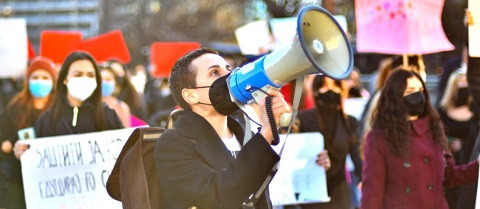
GCED Basic Search Form
Quick Search
You are here
News

International Women’s Day, held last 8 March, offered a chance for us to reflect on progress toward achieving gender equality across all areas of development from poverty, health and well-being to decent work and economic growth. Even more, it provided an opportunity to consider how these areas intersect, such as how gender equality in learning and skills development is critical not just for achieving parity in educational outcomes but also for equality in economic opportunities for all young people, especially girls.
This was the focus of UNESCO’s recent publication of Synergies for Youth: A Situation Analysis of the intersection of decent work, quality education and gender equality in South-East Europe, and in 2021, the significance of these intersections is perhaps clearer than ever before.
More than just shedding a light on existing inequalities, the pandemic has exacerbated them, leaving many young people, especially the most marginalized, out-of-learning and increasing their risk of not returning to school. Especially many girls and young women have unequal access to technology, fewer opportunities than young men to develop digital skills, and lower levels of confidence and perceived competence than boys, as they continue to face prejudice and social norms.
The immediate consequences of this gendered, digital divide are significant for girls and young women, as countries have relied heavily on technology to ensure learning continuity in the context of COVID-19. In the long run too, however, marginalized youth and especially marginalized young women will fall even farther behind in learning, labour market access and career opportunities unless priority is given both to closing the digital divide and building young people’s skills.
In addition to the potential long-term impact on learning outcomes and earnings, young people, especially young women, are significantly affected by job losses, as the pandemic has had a disproportionate impact on majority-female sectors. Domestic workers, who are primarily women, for example, have been heavily impacted in the region. Many of them are young people and migrants, leaving them without jobs, social security, or the ability to return home. Women who are self-employed have been the most affected.
At the same time, prolonged school closures, as well as new, pandemic-related working arrangements also mean that girls and young women are facing increased levels of unpaid care work and exposure to gender-based violence, sexual exploitation and heightened risk of child marriage and early and unintended pregnancy. These risks come alongside a reduction or pause in service delivery, such as for people with disabilities, a decreased ability to seek help, and difficulties in accessing essential health services, including sexual and reproductive health services and gynaecological and obstetric care.

While tertiary enrolment may show signs of improvement, the most marginalized young people are not seeing the benefits of these increases. Factors such as socioeconomic status continue to determine participation. Women face discrimination, bias and persistent social norms and remain underrepresented in fields such as science, technology, engineering, and math (STEM), especially ICT. Women participate in the labour force at lower rates than men but are overrepresented among unemployed youth. Young women especially are under-represented among those who are self-employed, highlighting challenges such as lack of skills, poor working conditions in small and medium-sized enterprises, and insufficient policies to support entrepreneurship.
The importance of not only acknowledging these intersections among gender equality, education, decent work, and economic growth but also leveraging this interconnectedness to accelerate progress has perhaps never been clearer than in the context of the COVID-19 pandemic. Interventions will be necessary that not only address gaps that existed prior to the pandemic but also respond to the immediate impact and mitigate long-term effects, especially for the most marginalized, including young women.

Gender inequality intersects with a broad range of other challenges facing girls and young women in South-East Europe and around the world. The multidimensional manifestation of this exclusion demands cross-sectoral and integrated efforts to bridge these gaps and improve the lives and prospects of not just girls and women but “of everyone, everywhere”.
Let us reflect on how COVID-19 has shed light on both the criticality of integrated policies and interventions in realizing the Sustainable Development Goals and the consequences of insufficient action for women and girls. But let us also not overlook the unique opportunity it has presented us to improve safeguards for young people, especially young women, and to fast-track progress toward gender equality now and for the future.
This blog was written by Sarah Fuller in memory of Igor Kitaev, with warm gratitude for his mentorship over the past years.
Links
- International Women's Day
- Synergies for youth: a situation analysis of the intersection of decent work, quality education and gender equality in South-East Europe
- Sarah Fuller LinkedIn
URL:
https://en.unesco.org/news/spotlight-gender-equity-during-and-beyond-covid-19-response
